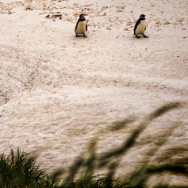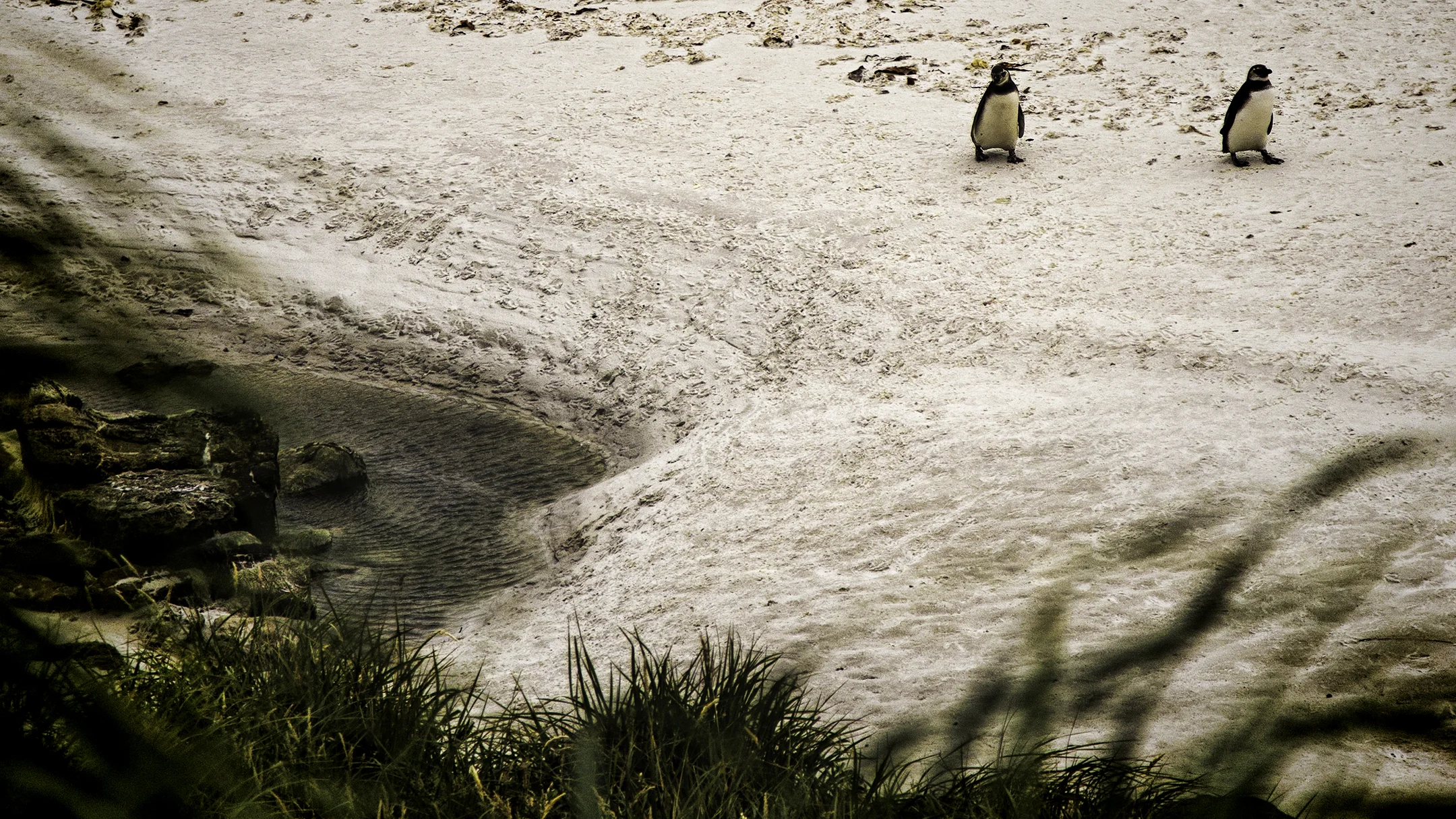We've left West Falkland and have traveled overnight on the Sea Explorer to Yorke Bay on East Falkland. This is only four miles northeast of Stanley, the capital city. Unlike yesterday when we had beautiful conditions while visiting East Falkland, the weather today is blustery with a sprinkle of rain. This is the South Atlantic Ocean with its unpredictable and evanescent weather patterns. I'm learning to suck it up and expect the unexpected!
I get off the shuttle at Gypsy Cove, a small estuary located on the west side of Yorke Bay. A number of different sensations become apparent to me as I trudge around the outskirts of the beach. Not only is the wind howling, but I see signs warning me to stay off the beach! As it turns out, this area was considered a strategic position with close proximity to Stanley and the airport. During the Argentine occupation of the Falkland Islands in 1982, the Yorke Bay beach was inundated with numerous anti-personnel and anti-tank minimum metal mines. This is referred to as unexploded ordinance, similar to what I experienced when I was in Laos. OK. I've been warned. I'll stay on the path!
As I peruse the beach, I notice that two Magellanic penguins have just popped out of the water and are cruising inland. This is a treat for me in that I've seen many Kings and Rock Hoppers already during yesterday's landings. Magellanic penguins, however, are indigenous to South America, and are much more elusive. They breed in coastal Argentina and Chile, as well as in the Falkland Islands. Named after the explorer, Ferdinand Magellan, who spotted these creatures in 1520, they are now categorized as Near Threatened by the IUCN.
As frequently happens, I'm confronted with photographing these Magellanic penguins in the moment. In a short amount of time, they will start moving away from me. There is no time to switch to my long lens. I start snapping away.
The Magellanic are flightless, aquatic birds, that have webbed feet and and wings reduced to flippers. They grow to between 24-30 inches and range in weight from 6.0 to 14.3 lbs. Distinctive in their look, they have black backs and white abdomens. On close inspection, I can see what looks like an inverted horseshoe between the head and the breast.
Proceeding along the trails to avoid the mines, the vistas along the coast are stark. Because of the conditions, large waves come crashing in. Caught up in reverie, I try to imagine the British coming ashore to defeat the Argentine army. Walking on the trail between the cliff heads, good views of Port Stanley and the open sea are visible.
Being a wildlife and landscape photographer, I admit that many times in my travels, more time is spent admiring the fauna than the flora. Even a neophyte such as myself, however, cannot help but appreciate the remarkable number of plant species that populate this area. From cushion plants that are several yards in diameter to a grass that grows to approximately three yards in height, my research discloses that there are 177 vascular plant species that are believed to be native to these islands.
The types of plants extant in the Falklands are largely the result of geography. The flora of these islands, positioned between the South American continent and the Antarctic, are at the eastern and southern limits of their range. Near the boundary of tolerance for environmental factors, the plant life is likely to be genetically or physiologically distinct from what is present on the mainlands.
As I cruise along the trails, I come to a beautiful fern in the acid grasslands of this area. While it is true that many ferns grow in moist, shady, woodland nooks, the plant I'm seeing resides in an open field in close proximity to the ocean. I'm attracted to its color and shape. Maybe I do have some interest in botany after all!
It's really starting to rain now. The lens on my camera is getting wet no matter what I do to protect it. It's clearly time to get back on the shuttle for a return trip to the Sea Explorer where it will be warm and dry. Despite the weather, Gypsy cove has been well worth seeing. I look forward to visiting Stanley this afternoon.




